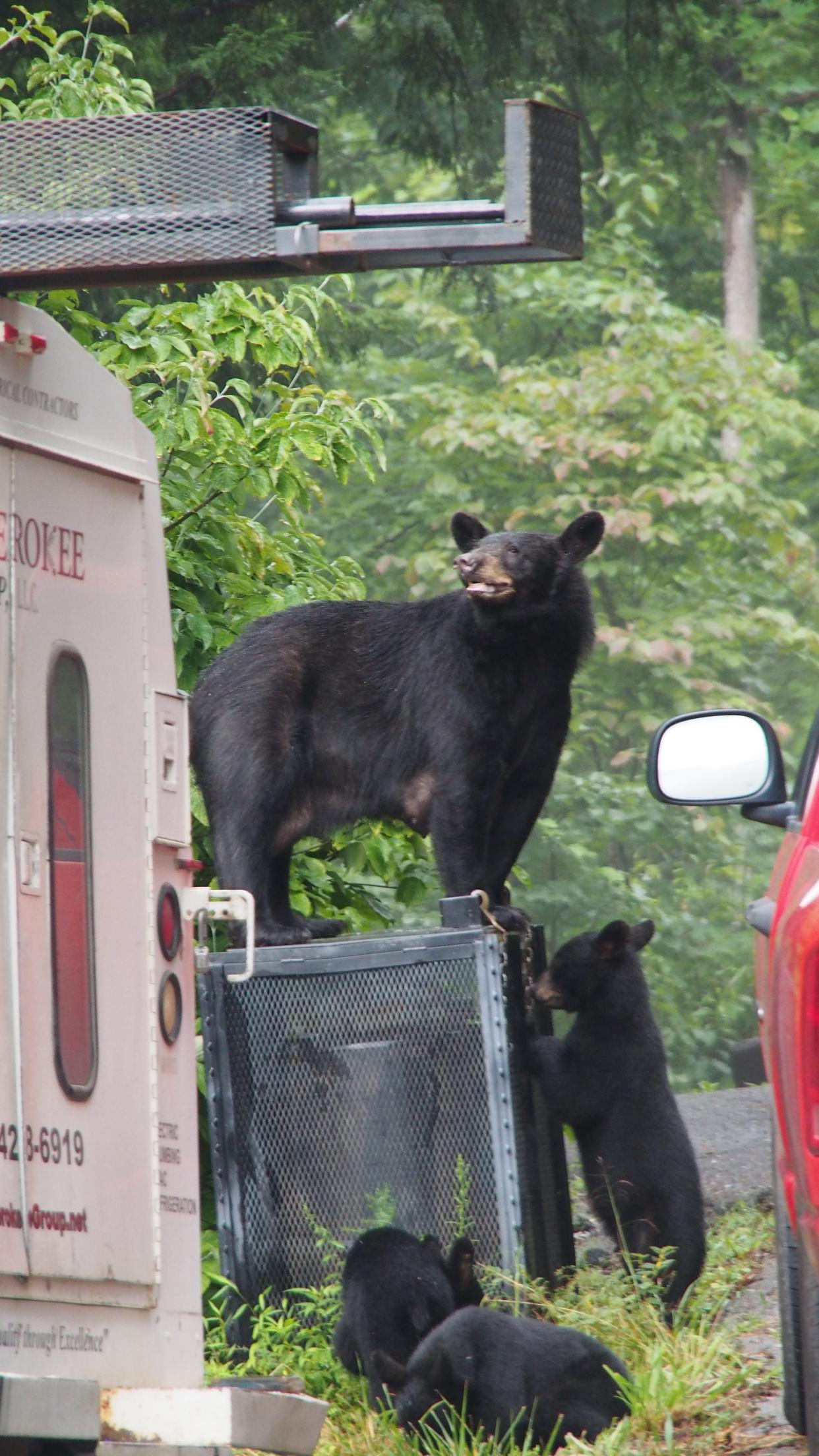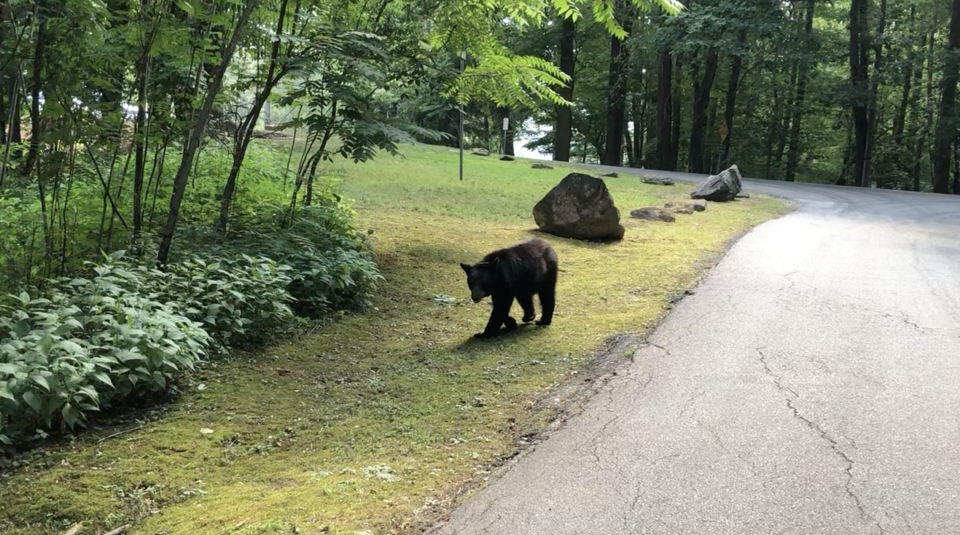WNC bear hunting season underway: Here's where to hunt, how to stay safe

ASHEVILLE - The 2022-2023 bear hunting season is underway in Western North Carolina, and with it comes the need for hikers to stay safe.
The season, which lasts from Oct. 17 to Nov. 19 and then picks back up again from Dec. 12 to Jan. 2, allows hunting on private property with property owner's permission as long as it is not within Asheville city limits, according to Justin McVey, district wildlife biologist at the North Carolina Wildlife Resources Commission.
He said it's important to know the rules of the land area where folks are not only hunting, but hiking, mountain biking or otherwise enjoying the outdoors.
Bear hunting is prohibited in many protected areas, including national parks, such as the Blue Ridge Parkway and Great Smoky Mountains National Park, he said. State parks and bear sanctuaries are also off-limits.
More:Will hunting in WNC bear sanctuaries be reversed? NC Rules Commission makes decision
More:Bear sanctuaries no more: NC Wildlife OKs hunting, critics plan to appeal decision
"Hunting is the best (bear) management tool that we have, but it also gives sportsmen an opportunity to hunt and do things they enjoy," McVey said. "We don't want bear numbers to get to a level that's too high, where you just start seeing more motor vehicle deaths, more diseases and things like that. We'd rather the mortality of bears, the surplus of bears be harvested."
Earlier this year, the Wildlife Commission approved limited bear hunting with a permit in Panthertown-Bonas Retreat, Standing Indian and Pisgah Bear Sanctuaries. However, in April the Rules Review Commission objected to the bear sanctuary rule because it lacked specific criteria by which the permits would be granted, according to Wildlife Commission spokesperson Mindy Wharton.

After revisions, the RRC approved the rule in May, but because it received more than 10 letters of objection, it is subject to review in the 2023 legislative session, and no bear hunting on these three areas will be allowed this bear hunting season, Wharton said. According to North Carolina regulations, hunting by permit is currently allowed in the Daniel Boone and Mount Mitchell Bear Sanctuaries."
Staying safe in the woods
All hunters of big game, including black bears, are required to wear an article of blaze orange clothing, per state rules.
To stay safe, Carolina Mountain Club Hike Leader Kathy Kyle recommends hikers also wear safety orange. McVey said he has never heard of a bear hunter shooting a hiker but also recommended wearing orange or other bright colors.
More:When will WNC fall color reach its peak? Experts call it the 'ideal' foliage season
More:With fall comes increased bear activity in Western North Carolina. Here's what to know
"It’s easy to forget that there are hunters in the woods, and when I am hiking with the Carolina Mountain Club I don’t see them often, but they are out there," Kyle said. "I was hiking near the Hard Times Road trailhead in Bent Creek this past Saturday and met a hunter heading out with a gun near the parking lot just before 5 p.m. I was reminded that hunting season is here, and I should be prepared to see hunters anywhere in the forest, no matter how tame or close to the city limits I happen to be."
Traveling as a group also helps because the "sound of people hiking identifies you as a hiker and not a target," she said, and dogs should wear orange too, because if they break off of their leash, they could be mistaken for a bear or deer.
Bear management
Colleen Olfenbuttel, Wildlife Commission Black Bear and Furbearer Biologist, said there are an estimated 7,000-8,000 black bears in Western North Carolina. The population continues to show "robust growth" of 3%-5% with the commission's latest data, she said.
"As outlined in our bear management plan, our population objective for the Mountain (Bear Management Unit) is 0% growth rate and we are not meeting this objective," Olfenbuttel said in an email. "The methods we use to try to meet bear population growth objectives is through our regulated hunting seasons structures, which include, but are not limited to, timing of hunt (e.g., start dates, end dates), length of the hunting season (e.g., number of day), and where to hunt, which influences hunter effort and success rates."
Bear season begins at different times throughout the state, but McVey said that the season takes place in the winter because it gives cubs, which are typically born in January or February, time to grow up and be on their own.
Hunters are required to get a Bear Management E-Stamp in addition to a valid hunting license with big game privileges if they wish to hunt bears. The E-Stamp costs $11 for those with annual, short-term or lifetime licenses purchased on or after July 1, 2014, but is free for those who bought a lifetime license before July 2014. Non-residents of North Carolina are also required to get a bear hunting license for $239.
In 2021, hunters harvested 1,230 bears in Western North Carolina. While official numbers for 2021 have not been published yet, Olfenbuttel said an estimated 13,352 bear hunters signed up for an E-Stamp during 2020.
"Most hunters who obtain the bear e-stamp privilege, which is needed to hunt bears in North Carolina, don’t actually hunt for bears during the season, for a variety of reasons (e.g., lack of time, health, lack of access to huntable land, other activities, work, etc…)," she said in the email.
Only one bear may be killed per person. To hunt bears, hunters use two different strategies, McVey said: Dogs or blinds. With dogs, hunters actively seek out the bears, using the dog's sense of smell to track bears down. Blind hunting is more passive, as hunters sit in tiny camouflaged structures and wait for bears to pass by. According to North Carolina regulations, in Western North Carolina dogs can be used to hunt all season, but unprocessed food can only be used until Nov. 19.
Hunters must also submit at least one premolar tooth from their harvested bear to the Wildlife Commission by January 31. According to regulations, hunters should pull two teeth and save the other in case the first gets lost. Regulations also say that hunters are not allowed to kill a cub, defined as a bear weighing less than 75 pounds, or a female bear with one or more cubs.
Bears may or may not be an issue in Asheville, McVey said, depending on who you ask.
"With any community that you ever deal with, whether it's dealing with bears, turkey, geese, deer, or what have you, generally tends to be about 50% of folks that have issues with a critter and then 50% who don't," he said. "So in Asheville, we do get complaints about bears, but we also have a lot of people that are really passionate about bears and want them to be around."
More:Live black bear (not the mascot) spotted by Asheville Tourists staff in McCormick Field
While hunting is the main way bears are managed, education and food regulation also play a part, McVey said. The more food put out by humans that bears find, whether it is through trash, birdseed or intentional feeding, the more cubs they have.
People who truly care about bears also care about coexistence with those bears, McVey said, and BearWise is an important education tool for those who want to keep bears wild and stay safe.
BearWise recommends six basics to stay safe from bears: Stay alert and stay together, leave no trash or food scraps, keep dogs leashed, camp safely, know what to do when you see a bear and carry bear spray.
Christian Smith is the general assignment reporter for the Asheville Citizen Times. Questions or Comments? Contact him at RCSmith@gannett.com or 828-274-2222.
This article originally appeared on Asheville Citizen Times: Bear hunting season: Here's where to hunt, how to stay safe

